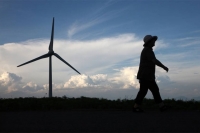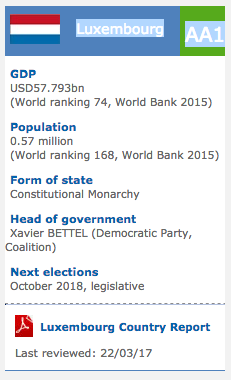Southern Africa: The Global Competitiveness Index in 2016
2016/10/02

A ten-year decline in the openness of economies at all stages of development poses a risk to countries’ ability to grow and innovate, according to The Global Competitiveness Report 2016-2017, which is published today.
The report is an annual assessment of the factors driving productivity and prosperity in 138 countries. The degree to which economies are open to international trade in goods and services is directly linked to both economic growth and a nation’s innovative potential. The trend, which is based on perception data from the Global Competitiveness Index (GCI)’s Executive Opinion Survey, is gradual and attributed mainly to a rise in non-tariff barriers although three other factors are also taken into account; burdensome customs procedures; rules affecting FDI and foreign ownership. It is most keenly felt in the high and upper middle income economies.

“Declining openness in the global economy is harming competitiveness and making it harder for leaders to drive sustainable, inclusive growth,” said Klaus Schwab, Founder and Executive Chairman, World Economic Forum.
The report also sheds light on why quantitative easing and other monetary policy measures have been insufficient in reigniting long-term growth for the world’s advanced economies. The report finds that interventions by economies with comparatively low GCI scores failed to generate the same effect as those performed in economies with high scores, suggesting that strong underlying competitiveness is a key requirement for successful monetary stimulus.
The report offers insight into how priorities may be shifting for nations in earlier stages of development. While basic drivers of competitiveness such as infrastructure, health, education and well-functioning markets will always be important, data in the GCI suggests that a nation’s performance in terms of technological readiness, business sophistication and innovation is now as important in driving competitiveness and growth.

The Global Competitiveness Index in 2016
For the eighth consecutive year, Switzerland ranks as the most competitive economy in the world, narrowly ahead of Singapore and the United States. Following them is Netherlands and then Germany. The latter has climbed four places in two years. The next two countries, Sweden (6) and the United Kingdom (7) both advance three places, with the latter’s GCI score being based on pre-Brexit data. The remaining three economies in the top ten; Japan (8), Hong Kong SAR (9) and Finland (10) all move backwards.
WhileEuropeaneconomies continue to dominate the top ten, there remains no end in sight for the region’s persisting north-south divide. Spain improves by one point climbing to 32, however Italy drops back one place to 44 and Greece reverses 5 places to 86. France, the Eurozone’s second largest economy, climbs one place to 21. For all economies in Europe, maintaining and improving prosperity levels will depend heavily on their ability to harness innovation and the talents of their workforces.
There is some sign of convergence in the competitiveness of the world’s largestemerging markets. China, on 28, remains top among the BRICS grouping although another surge by India – which climbs 16 places to 39 – means there is now less of a gap between it and its peers. With both Russia and South Africa moving up two places to 43 and 47 respectively only Brazil is declining, falling six places to 81.
The competitiveness gap in East Asia and Pacific, meanwhile, is widening. Although 13 of the 15 economies covered consecutively since 2007 have been able to improve their GCI score over the past decade, this year sees reversals for some of the larger emerging markets in the region: Malaysia drops out of the top twenty, falling seven places to 25; Thailand drops two to 34; Indonesia falls 4 places to 41 while the Philippines drops ten to 57. A consistent theme for all the region’s developing countries is the need to make inroads into the more complex areas of competitiveness related to business sophistication and innovation if they are to break out of the middle-income trap.
The drop in energy prices has heightened the urgency of advancing competitiveness agendas across the Arab world. With three economies in the top thirty; the United Arab Emirates (16); Qatar (18); and Saudi Arabia (29) there remains a clear need for all energy-exporting nations to further diversify their economies and for much greater effort to improve basic competitiveness among the region’s energy-importing nations.
Two countries in Latin America and the Caribbean make it into this year’s top 50. Chile, the outlier in the region on 33, climbs two places although the gap is closing with the second highest ranked economy, Panama (up 8 places to 42). Next comes Mexico which performs strongly with a 6-point climb to 51. Argentina and Colombia, the third and fourth largest economies in the region, rank 104 and 61 respectively.
One of the most improved nations in sub-Saharan Africa is Rwanda, which rises 6 places to 52. It is closing in on the region’s traditionally most competitive economies, Mauritius and South Africa, although both these countries register more modest improvements, climbing to 45 and 47 respectively. Lower down the ranking, Kenya climbs to 96, Ethiopia holds steady at 109 while Nigeria slips three to 127.

“To me, the interest in economic growth comes from the fact that it is potentially so important for improving human welfare.The Global Competitiveness Reporthelps us understand the drivers of growth and this edition comes at a time of stalling productivity, the main determinant of future growth,” said Xavier Sala-i-Martin, Professor of Economics at Columbia University.
- Related Articles

Top 10 Most Attractive Investment Destinations In Africa
2017/08/20 Africa’s feverish increase has decelerated in recent years and a lot of nations have buckled under the pressure of falling resource prices, security disruptions, fiscal imprudence and adverse weather conditions.
Africa's Relationship With China Is Ancient History
2017/07/02 In 2002 South Africa's Parliament unveiled a digital reproduction of a map - of China, the Middle East and Africa - that some speculated could be the initial map of the African continent. The Da Ming Hun Yi Tu - the Comprehensive Map of the Great Ming Empire - was drawn up around 1389 during the Ming Dynasty, according to historian Hyunhee Park.
Africa: Making Things Happen at the Bank - 'Not a Talk Shop' - Akin Adesina
2017/07/02 Dr. Akinwumi Adesina is focusing on five areas to achieve the African and world goals for a prosperous continent since becoming president of the African Development Bank - Africa's major public financial institution in September 2015. He was a keynote speaker at this month's Corporate Council on Africa's U.S.- Africa Business Summit in Washington D.C. and moderated a lively panel with five African government ministers. He as well received the Gene White Lifetime Succcess Award from the World Child Nutrition Foundation. This week, he was named the 2017 recipient of the World Food Prize, a prestigious honor that includes a $250,000 award. In an interview in Washington, DC, Adesina discussed the Development Bank's ambitious schedule and his vision for attracting the increase capital Africa needs. Posting questions for AllAfrica was Noluthando Crockett-Ntonga.
Climate change laws around the world
2017/05/14 There has been a 20-fold increase in the number of global climate change laws since 1997, according to the most comprehensive database of relevant policy and legislation. The database, produced by the Grantham Research Institute on Climate Change and the Environment and the Sabin Center on Climate Change Law, includes more than 1,200 relevant policies across 164 countries, which account for 95% of global greenhouse gas emissions.
Japan aims to increase Africa’s power generation capacity by 2,000 megawatts
2017/04/19 Between 2016 and 2018, Japan has pledged to invest $30 billion in Africa’s development, as it bids to join the likes of China and the US in the battle for influence on the continent. Competition in Africa is heating up, with Japan aiming to increase its presence and influence on the continent as it looks to make up ground lost to China since the turn of the century. Japan launched the Tokyo International Conference on African Improvment(TICAD) back in 1993, and since again has invested around $50 billion in Africa, a meagre sum at the same time as compared to China and the US.
- Southern Africa News
-
- SOUTH AFRICA: KPMG's South Africa bosses purged over Gupta scandal
- SOUTH AFRICA: Zimbabwe Election Commission keen to avoid Kenyan situation
- KENYA: Kenya, Nigeria & S. Africa: biggest winners of Google's Africa tech training
- ANGOLA: Submarine cable deployed in Angola to link Africa to South America
- AFGHANISTAN: UNWTO: International tourism – strongest half-year results since 2010
- BOTSWANA: Why governments need to support the financial sector to meet the unserved needs of smallholder farmers
- Trending Articles
-
- SOUTH AFRICA: Nigeria and South Africa emerge from recession
- BAHRAIN: Bahrain issues new rules to encourage fintech growth
- ARUBA: Director of Tourism Turks and Caicos after Irma: Tourism, visitors, hotels current status
- ANGOLA: Angola: Elections / 2017 - Provisional Data Point Out Qualified Majority for MPLA
- WORLD: How fair is our food? Big companies take reins on sourcing schemes
- CHINA: Russian firm seals energy exploration deal to drill South African shelf




.gif?1356023993)







